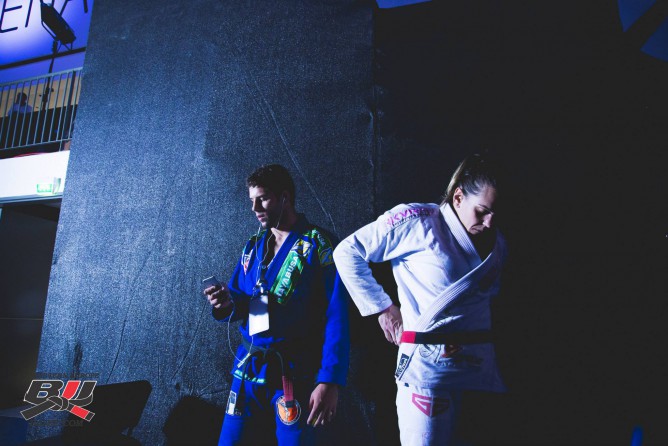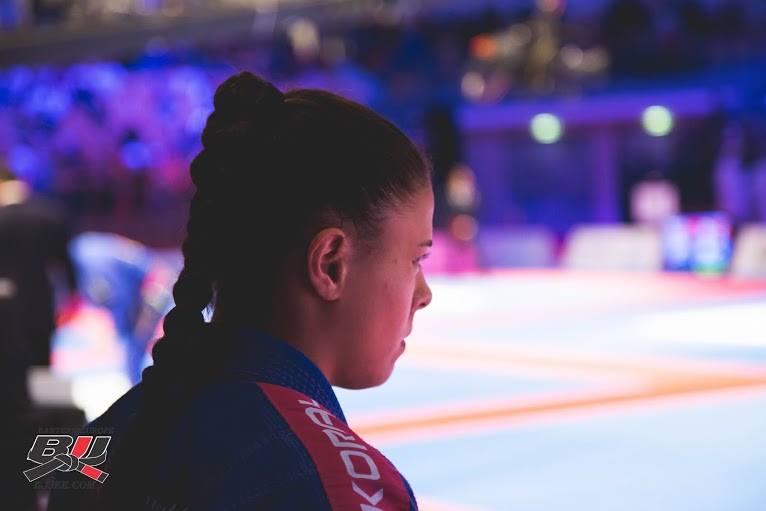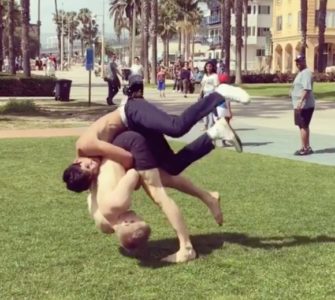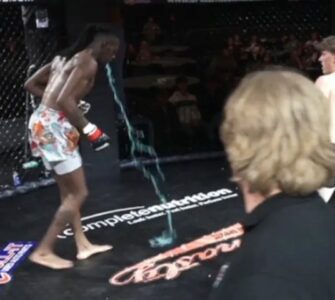Written by Johan De Wannemaeker
A sunny, Sunday morning… A car pulls up into a parking lot of a sports complex. You are finding yourself behind the drivers’ seat. Slowly you turn off the engine while your fingers are still clamping on to the steering wheel. A chilling sensation suddenly hits your spine. The nervous conversations of fellow team mates are barely noticed. As you walk through the entrance, the sports bag seems to weigh a lot heavier than it usually does. Nervously you give your name to the entrance staff who cross out your name on the fighters list. Slowly making way to the warm up area, you see people in GI’s with flashy pads and headphones jumping up and down; there eyes fixed straight ahead; ready for whatever is coming…For some undefined reason you feel like a fish in a pool of sharks about to be ripped to pieces. Everyone seems ready except you. Trying to shake off the negative sensations, the GI is put on. But that doesn’t make the jitters go away…On the contrary; now the thoughts begin to take a physical toll. The stomach feels like it’s about to explode; limbs feel heavy and useless. After a light flow roll with one of the teammates you already feel completely depleted and gassed. Spread out on the floor, desperately trying to get some order in the chaos, eyes are closed in an attempt to peace the mind…unfortunately to no avail; thoughts are still racing in a thousand directions at the same time, your heart feels like it’s going to pump out of your chest. Then you realize it’s only 10 more minutes until your first fight; a slight panic sensation has you in its power now.
Just when you think things couldn’t get any worst; your opponent is spotted out of the corner of the eye. A hooded broad-shouldered individual…sitting quietly in his corner with his earphones on. All you can see it’s the huge chest and shoulders….he looks calm and ready…Your self confidence is at an all time low now. As a matter of fact, you now wish you hadn’t looked at the brackets last night. The name sounds Polish or Russian; which usually stands for a “do or die” mentality with violent wrestling takedowns, lots of pressure and a heavy top game.
Suddenly your name is called out. As in a dream, you walk to the mat number that was just announced. Your team mate last minute advice is overshadowed by an all consuming fear. It’s a miracle that you can still stand on your legs with this type of pressure, let alone fight some hulk from behind the former iron curtain.

Walking on the mat you feel like the whole world is watching you…it’s an uneasy, choking sensation. During the shake off your opponent glances right through you, the emotionless eyes of a wild animal…At this point your heart feels like it’s going to beat out of your chest.
Out of instinct you shoot in for a double immediately. It’s like hitting a brick wall. Your opponents’ sprawl sends your face firmly planted into the mat. Your guard, so highly praised by your teammates in practice, is quickly smash passed. The pressure is unbelievable and you can feel your lungs shrink to the size of a peanut. While your head is forced away by the shoulder pressure you are faced by the reality of the scoreboard. Not only does it tell the tale of hopelessly trailing in points but, and this is far worst, indicates that there is still an eternity to go!
Does the above story sound familiar? No? Praise yourself lucky then as you are one of the very few. In fact, most sport psychologists state that at least 4 out of 5 competitors will, at some point in their careers, suffer from moderate to severe competition jitters.
As a competitor, being in a nervous, uneasy state of mind before a tournament is not unfamiliar to me. Although I have lived through similar experiences, I can honestly say the paralyzing effects of extreme stress levels were more prominent during the early competition days. Once the advanced and elite division levels were reached; the acquired knowledge and experience brought confidence and self belief which turned out to be very efficient tools to keep calm and cool during a competition. This being said I still get the sweaty palms from time to time…
Sweaty palms, racing thoughts, increase in heartrate, trembling,…all these symptoms prior to a fight can be traced back to our animal origins. In analogy with other species, being faced with immanent danger our brains will assess the situation, resulting in a ‘flight or fight’ reaction. In a quest for self preservation the decision will more likely be in favour of ‘flight’ then ‘fight’. Even in the animal kingdom it has been noted by zoologists that rivalry between wild cats will only turn into a violent altercation in less than 10% of all cases.
Although humans don’t live in caves and don’t rely on hunting and collecting fruits for survival anymore, the hormones pumped from our brain to our body still tell the same story (even in a controlled fight with set rules to secure safety): “Hey, don’t fight as we might get injured or killed. Let’s make a run for it!!”.
It’s not an easy task to find a way to appease oneself in an extreme situation. That’s to say: it can be quite a hassle to find out what works for YOU. Some have found success in yoga, thai chi, powernaps or pumping gangster rap music. Others turn to sport psychology therapy, mental mapping, superstition or even simply thinking about a relaxing sunset. Personally, when the competition ride gets tough or when things on the mat are looking grim and desperate, I tend to find inspiration in unstoppable and notorious historical personalities like Colonel Hans-Ulrich Rudel. No matter how bad things look on the mat, this guy had it a 1000 times worse.
Now unless you are an air force historian or obsessed with WW2 this name will not ring any bells. That’s actually a shame as we will probably be well into the next millennium (or never for that matter) before anyone will even come close to match Rudels’ feats. In fact, it’s pretty safe to say that, if Rudel had been an American or Brit, Hollywood would have made at least a dozen movies about him by now. But he happened to be on the loosing side so his performances weren’t picked up and stay largely unnoticed by the general public.
Rudel flew 2530 combat missions during WW2. Note that this was during the same war where Allied bombers only flew 25 missions at the most during their entire WW2 career as this was considered by army psychologists to be the mental breaking point for the crews. In comparison: this guy did MORE THAN 1000 TIMES that number. In total he flew 600.000 km using more than 5.000.000 liter of fuel. Rudel dropped more than 1000.000 kg of bombs on his targets, fired over 1.000.000 machine gun rounds, around 150.000 20mm rounds and over 5000 37mm canon rounds. The casualties he made included 519 tanks, 70 landing crafts, 1 battleship, 1 destroyer, 2 cruisers, around 1000 various vehicles, 150 artillery installations, 11 fighter planes and a whole bunch of bridges, communication infrastructures, trains, etc.. This would be more or less the equivalent of an army of a small country…all destroyed by one man!!
Needless to say that Rudel was a bad dude. He showed unmatched power, mental toughness, fearlessness and determination on the battlefield. He was so ridiculously tough Uncle Adolf and his friends ran out of medals to give to this guy. He was awarded the knight’s cross four times (Germany’s highest military decoration) and instead of giving him the same medal a fifth time it was decided to throw all the existing medals together to form a new ‘super’ decoration. So on the 1st of January 1945, Hitler in person decorated Rudel with the ‘Knight’s cross of the Iron cross with Golden Oak Leaves, Swords and Diamonds’. To this day he’s the only man in German military history to have received this decoration.
Although his badass feats alone can be a source of inspiration there is more. Rudel was not born as the highest decorated pilot ever. In fact, even well into the war the young cadet looked an unlikely candidate for even becoming a combat pilot. Actually the life of Rudel had always been littered with adversity and hardship. Even to such an extent that I believe this to be the true reason of carrying him in my thoughts every time I am about to step on the mats.
Because if Rudel’s actions speak for themselves, it’s his unlimited ability to overcome enormous odds that is the real inspiring motivator here. In other words: this guy knew how to carry himself in battle AND keep it together under pressure. He might have officially destroyed a few thousand of Stalin’s toys but was shot down or had to crash land over 30(!) times (although he always managed to return safely to base). He was seriously injured four times (including an amputated lower leg) but always came back to the ass kicking business shortly after.
Born in Silesia in 1916, as the son of a Lutheran minister, the passion for flying was already surfacing at an early age as 8-year old Rudel jumped off a roof with an umbrella (earning him a broken leg). Growing up in the 1930s it became apparent that the ruling national-socialist party needed the skills of millions to fulfil their evil plans. This opened career opportunities for young, ambitious Germans, like Rudel. Being blond, athletically build and into sports he fitted nicely into the Nazi ideology of how a future warrior needed to look like.
However, this could hardly disguise the fact that he was a very mediocre student. Struggling to master the skills needed to fly one of the Reich’s divebomb planes. The change of air pressure when the plane plunged thousands of feet, the G forces that came into play when pulling-up proved too much for the cadet. Being from the countryside and having a modest background didn’t help either. Back then the Luftwaffe was a real magnet for upper class kids from the military aristocracy who saw a career in the air force as an ideal way to impress chicks, throw fancy parties and having a lot of stories to brag about. Needless to say that Rudel didn’t really fit the picture. Nevertheless, he decided to work hard and give it his very best. His boyhood dream was within grasp and by God, he would not let anyone take it away from him. One of his instructors recalls Rudel as a bit of a strange bird: ‘He doesn’t go to parties, doesn’t smoke, only drinks milk and has no stories to tell about women; he spends all his free time playing sports”.
His hard work paid off as he graduated from the academy by a hair’s breathe. Although he was accepted in the Luftwaffe it was decided that Rudel was unfit to fly the Junkers 87 (nicknamed “stuka”), the state of the art dive bomber who would become one of the most famous planes of WW2. Instead he was transferred to a reconnaissance unit. Spending the campaign in Poland taking pictures out of a Fiedler Storch was a bitter disappointment for Rudel. As the German forces overran most of Western Europe the Luftwaffe was called into action to break the resistance over the channel. Disappointed he had to sit this one out and watched as his graduation companions took off from the airstrips to attack ground targets in Britain. He started to wonder if he would ever see the inside of a Stuka cockpit. Transferred to a reserve unit in Crete didn’t bring the desired effect either: The commanding officer, taking a look at Rudel’s file, refused to let him fly one of the machines, commenting that ‘it would just be a costly waste of material.’
But with the invasion of the Soviet Union came the opportunity he had so desperately been waiting for. The hungry, young pilot wasted no time and flew four missions in his very first day of combat; amassing 100 after one month; which earned him his very first medal: the Iron Cross first class. Rudel was not the most technical pilot but his boldness and eagerness for combat made up for it. His comrades watched more than once how Rudel would plunge in almost completely vertical towards his target, ignoring the plane’s automatic dive-recovery system, only pressing the bomb release switch at the very last moment and then pulling the stick, often the plane would pull back up a few meters above the ground. In fact, he usually came in so low that his Stuka would fly directly through the orange-red cloud of the exploding target, riddling the plane with shrapnel.
Because of the changing oxygen levels and the risk of the pilot passing out, this tactic was considered too dangerous by most Stuka pilots. Therefore they would drop their bombs a long way above the targets, resulting in a higher rate of misses. ‘He’s the best man of my squadron’, his superior officer said: but he’s not going to live very long.’
In November 1941 Rudel became an instant celebrity and was shown on all the newsreels across Germany. Relying on his suicide vertical leap he was able to sink the 23,000 ton battleship ‘Marat’. The odd, countryside boy with learning difficulties blew up one of the biggest battleships the Soviets possessed. One of his comrades at the academy would later recall that he could simply not believe that the newsreels spoke about the same Hans-Ulrich Rudel he had known during the early training days. How bitter sweet he must have felt towards the ones that had no faith in him!
From then on things got serious. By the end of December he had flown his 400th mission; Barely two months later he became the first pilot of the entire war to fly 1000 sorties (with a score of more than 100 tanks destroyed). Newly equipped with 37mm gun barrels under the wings, Rudel started to specialize in destroying tanks. During the battle of Kursk in July 1943 he destroyed 12 tanks in his very first day of action.
Back in those days it was seriously no fun driving a Russian tank in the Ukrainian steppe; due to a certain psychotic dive bomb pilot the life expectancy of a tank crew was cut depressively short. Dozens of them would meet there final destiny by the hands of Rudel. The sight of a slowly, circling plane high above in the sky (no wonder he was known to friend and feud as the ‘the eagle of the eastern front’) was enough to bring disarray and chaos in the ranks of a Russian convoy. Once in the crosshairs of the “eagle”, very few escaped. Every attack was always followed by the same predictable result: countless piles of red-yellow flames and smoke. Exploding ammunition, metal and human body parts melted together in grotesque statues that would put any modern work of art to shame, while Rudel would slowly disappear behind the horizon, making his way back to base for a well-deserved glass of milk. The fact that this happened in 1943 and 1944 makes it even more remarkable: everywhere the German army is on the retreat with the Russians pushing forward on all fronts, amassing enormous army groups with overwhelming superiority in both manpower and equipment.
So it’s pretty unbelievable that one man was able to affect the Soviet’s morale at this stage of the war. It even came to the point that Stalin himself put out a 100,000 roubles bounty on Rudel’s head…dead or alive.
Although being something like a one-man meat grinder Rudel also proved his value as a life saver. An insanely dangerous habit of him was to land behind enemy lines to pick up a crew that had crash landed there. Then with all of them cramped up in the plane’s cabine; Rudel would take off, all guns blazing and right under the nose of a surprised enemy.
One day in March 1944 disaster struck: On one of his typical search & rescue missions and deep behind enemy lines his plane (too heavy with the extra men on board) wasn’t able to take off because of the surface being too moist. Soviet troops closed in quickly. Rudel, his rear gunner and the rest made a run for it. They had no other choice then to swim across the icy Dniester. Right before reaching the other bank his rear gunner drowned. The others were soon captured but Rudel refused to give up: shot in the shoulder, barefooted with Russian patrols in hot pursuit, he ran across 30 miles of hostile territory before reaching the German lines. Even after this ordeal he was back in action within days: flying his 1800th sortie and setting a new record with 17 tanks busted in just a single day at the office.
Soon after this it was time again to pay another visit to the most successful Charly Chaplin impersonator of all times for tea, biscuits and a well-deserved big, fat medal. Adolf told Rudel he was too valuable to be lost to the enemy and would from now on have a boring, non-combat job as instructor pulling the ears of Hitlerjugend boys who were lining up to follow in Rudel’s footsteps. The dive bomb ace calmly replied that Hitler could shove his medals if he was not allowed to fly combat missions anymore. This made everyone nervous in the room as telling the Fuhrer to shove it generally included for someone to be blindfolded and having 12 rifles pointed at their chest with ‘feuer!’ being screamed in the background. But Hitler was a good sport and gave in, what else could he do? It was just impossible to keep Rudel away from a fight…
Having acquired the status of a national hero never made any impression on Rudel. He had always been known as a humble, hardworking man with no high regards towards stardom. Despite being known to his superiors as arrogant and rebellious, his battle comrades remembered him as a cheerful, optimistic character with a strong sense of duty. Indeed, looking at wartime photos of Rudel one cannot help notice the broad smile on his face and this despite the incredible hardship of daily life at the eastern front. He often spoke about the teamwork involved for a successful mission and never failed to emphasize the competence of his rear gunner (although everyone knew it was really a one-man show). It’s no surprise that one of his rear gunners called Hentschel would become the most successful and decorated rear gunner in the German army.
Incredibly, even with this unstoppable ass-kicking machine on their side, the Nazi’s defeat looked inevitable. But the closer Germany was edging towards the abyss the more successes Rudel accumulated. At the end of 1944 he topped his 2400th mission with more than 450 tanks destroyed. His rightleg was shot up pretty bad but undaunted Rudel continued to fly with his leg in a cast. Early February 1945 a flak round blew off most of his rightleg. Although a half-conscious Rudel was able to crash land his aircraft, the remainder of his leg had to be amputated. It only took till Easter for a one-legged Rudel to be back in action: adding several tanks to his tally before the end of hostilities on the 8th of May. Rudel flew his squadron to an English air force base to surrender so Iwan never got the chance to collect Stalin’s bounty. In fact, he survived both Hitler and Stalin by several decades as the good lord only decided to pull the plug on Rudel in 1982. At the end of his life Rudel was asked how he dealt with the constant stress of being outgunned, outnumbered and shot at by a superior enemy. ‘Lost are only those who give up on themselves’.: he answered.
Rudel’s case shows us what an ordinary individual is capable of when a state of self-realisation is reached. When every, single possibility that is hidden in our ‘self’ is realized into actions that will stun the surrounding world. Difficult circumstances are excellent breeding grounds for this existential process. It’s only when Rudel faced a fearsome enemy and the situation became more and more hopeless that he was able to explore the real depths of his endurance and strength levels. Back in the 18th century a samurai called Tsunetomo already stressed the importance of tenacious and fearless behaviour in desperate situations: ‘…Even if it seems certain that you will lose, retaliate. Neither wisdom nor technique has a place in this. A real man does not think of victory or defeat. He plunges recklessly towards an irrational death…’. When battling an enemy that is considered superior one should not concentrate too much on his strength and how this might influence winning or losing. The strength of your adversary lies in the very fact that he is considered powerful and emphasizing this will only confirm your disadvantageous position. The stress released by this knowledge will inevitably sent you in a downward spiral; sealing your faith even before stepping onto the mat. Far better is it to search for the strength within; lay out a strategic plan; camouflage your weaknesses with eagerness to fight; be more ambitious than all your opponents put together; nibble away at their strength and numbers…striking fast; showing no fear of death nor defeat; standing firm and tall on the battlefield.
“The duty of a soldier is heavy like a mountain but his death is light like a feather” reads an old “bushido” code of conduct. This phrase sums up nicely how Rudel was able to excel in battle for five long years. He was willing to do what neither ally nor enemy dared on the battlefield. But in order to do so he had to detach himself from the urge for self-preservation; becoming accustomed to the idea that death and serious injuries were immanent; almost trivial. Once this was accomplished he became virtually unstoppable with feats that far excelled everyone else’s (even that from an enemy superior in numbers and material). From then on it was only a matter of time before the enemy started to fear the one man who had reached the mental status of a modern day samurai. Ultimately, indifference to death reversed every stress level involved. Instead of the above mentioned paralyzing effect, they contributed to his heroic acts on the battlefield. Even to the point where it became an enjoyable experience and this despite the hopelessness of the overall military situation. Tsunetomo also advices to dash forward with joy and bravery in difficult situations describing it as “the more the water, the higher the boat”.
So next time you are stepping on the mat will you be fearless and calm like Rudel or will you succumb at the moment of truth? Will you dash forward with determination when faced with a formidable opponent? Or will his reputation and appearance defeat you even before the battle has started?
These are issues that need to be addressed before signing up for a competition. In order to become victorious, one needs to become undefeatable in his mind. Only then will the stress involved be sharpened into a powerful weapon.

















